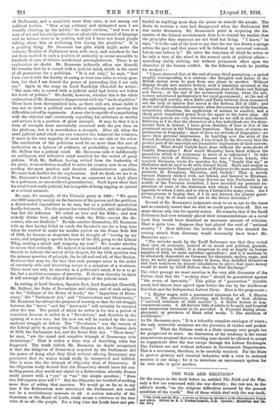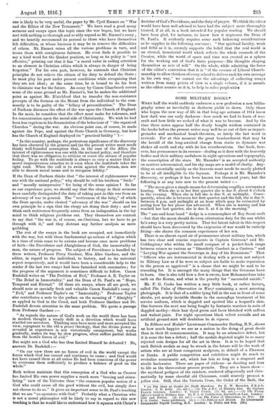THE WAR AND RELIGION.*
OF the essays in the book before us, entitled The Faith and the Was', only a few are concerned with the war directly ; the rest are, in the editor's words, "on the religious difficulties aroused by the present condition of the world." But of those which deal with the war itself, • The Faith and the War : a Series of Essays by Members of the Ohurehmen's Union and ethers. Baled by F. J, Yoakge-Jackson, D.1), London; Aismalltan and Ofr. Les, netj one is likely to be very useful, the paper by Mr. Cyril Emmet on ".War and the Ethics of the New Testament." We have read a good many sermons and essays upon this topic since the war began, but we have met with nothing so thorough and so ably argued as Mr. Emmet's essay ; and we heartily recommend its perusal to those who have themselves felt difficulties, or whose business it may be to remove the difficulties of others. Mr. Emmet raises all the various problems in turn, and treats them with conspicuous fairness. He even finds it possible to say a kind word for the Quaker position, so long as its policy is "not effective," pointing out that it has "a moral value in calling attention to an element in Christian ethics which is always in danger of being forgotten." For his own part, however, he contends that Christian principles do not relieve the citizen of his duty to defend the State ; he must play his part under present conditions while recognizing that they are not ideal ; at the same time, he is bound to do his best to eliminate war for the future. An essay by Canon Glazebrook covers some of the same ground as Mr. Emmet's, but he makes the additional point as against Mr. Blatchford that to transfer the non-resistance precepts of the Sermon on the Mount from the individual to the com- munity is to be guilty of the "fallacy of personification." The Dean of Durham discusses the effect of the war upon the Church of England. In the main, he considers that the effect must make for tolerance, and for concentration upon the moral side of Christianity. We wish he had been less captious in his denunciation of the behaviour of "the organised Churches" during the war. An obvious point can, of course, be made against the Pope, and against the State Church in Germany, but how has the Church of England displayed its "practical futility" 7—
" In this country, perhaps, the portentous significance of the discovery has been obscured by the general and (as the present writer must needs think) well-founded assumption that, in the case of the Allies, the interest of righteousness was one with the national policy, and therefore that there was no obligation to criticise or resist the stream of popular feeling. To go with the multitude is always so easy a matter that no moral impressiveness attaches to it even when the multitude takes the right road. When the call is to swim against the stream, men are able to discern moral issues and to recognise fidelity."
If the Dean of Durham thinks that "the interest of righteousness was one with the national policy," why should he call his brethren " futile " and "morally unimpressive" for being of the same opinion ? So far as our experience goes, we should say that the clergy in their sermons have carefully distinguished the duty of taking part in this war from an advocacy of war in generaL The "restiveness of the laity," of which the Dean speaks, under clerical "advocacy of the war" should on his own principle be a sign that the clergy are doing their duty ; and we think such restiveness frequently arises from an indisposition in the lay mind to think religious problems out. They themselves are content to say" that "the war is, of course, un-Christian, but we have to go through with it," and they distrust any further analysis as mere quibbling
The rest of the essays in the book are occupied, not immediately with the war, but with those fundamental qu estions of religion which in a time of crisis cease to be axioms and become once more problems of faith—the Providence and Almightiness of God, the immortality of man, the nature of progress. The subject of Providence is handled by three writers, Professor Percy Gardner, Miss Alice Gardner, and the editor, in regard to the individual, to history, and to its universal aspect respectively, and it would have been a considerable help to the reader if the last two essays had been furnished with summaries ; for the progress of the argument is sometimes difficult to follow. Canon Raahdall writes on "The Problem of Evil," Professor A. E. Taylor on "The Belief in Immortality," and the Dean of St. Paul's on "Hope, Temporal and Eternal." Of these six essays, where all are good, we should note as specially fresh and valuable Canon Rashdall's essay on "Evil," and Professor Taylor's on "Immortality." Professor Taylor also contributes a note to the preface on the meaning of " Almighty " as applied to God in the Creed, and both Professor Gardner and Dr. Rashdall devote attention to the same problem. We quote a passage from Professor Gardner :— "As regards the nature of God's work on the world there has been in modern thought a steady drift in a direction which would have startled our ancestors. Thinking men have more and more accepted the view, repugnant to the old a priori theology, that the divine power as revealed in experience is not victoriously omnipotent, but works gradually, makes its way by slow progress, often suffers partial defeat
from the hostile forces of evil."
But might not a God who has thus limited Himself be defeated ? No answers Dr. Rashdall :— "On our view there are no forces of evil in the world except the forces which God has caused and continues to cause ; and God would Cot have caused them at all unless He had been conscious of the power to overcome them sufficiently to produce a balance of good on the whole."
Both writers maintain that this conception of a God who as Creator has limited His own power supplies a much more "bracing and stimu- lating" view of the Universe than "the common popular notion of a God who could cause all the good without the evil, but simply does not choose to do so." It gives an important sense to St. Paul's teaching that we are "co-operators with God." Probably what a Christian who is not a moral philosopher will be likely to say in regard to this new teaching is that he would like to understand how it squares with Christ's
doctrine of God's Providence, and the duty of prayer. We think the editor would have been well advised to have had the subject more thoroughly treated, if at all, in a book intended for popular reading We should have been glad, for instance, to know how it impresses the Dean of St. Paul's. It evidently requires some such balancing considerations as ho supplies in the following sentence : "Our spiritual faculty, weak and fitful as it is, strongly supports the belief that the real world is an eternal, immaterial world which reflects the whole counsels of tho Creator, while the world of space and time was created as a sphere for the working out of God's finite purposes—His thoughts shaping themselves as acts of wilL" On the whole, while admitting the force of the editor's contention that it is "of the essence of Liberal Church- manship to allow thinkers of every school to deliver each his own message in his own way," we cannot see the advantage of collecting essays written from many points of view in a single volume, if it is meant, as the editor assures us it is, to help to solve perplexities



























 Previous page
Previous page